
The Town of Herndon is conducting an external review after the Fairfax County Criminal Justice Training Academy said it will stop sending graduates to the Herndon Police Department.
The move came after Herndon Police Chief Maggie DeBoard reportedly took issue with graduation certificates that were signed in Chinese by the academy’s director, Major Wilson Lee, who is Chinese American.
“This is not acceptable for my agency,” she wrote to Lee in an email, according to a report by the Washington Post. “I don’t want our Herndon officers to receive these.”
In a statement released yesterday (Thursday), Herndon Town Manager Bill Ashton II said the town is reviewing the incident to “determine intent by all parties.”
“Our objective is to restore our mutually beneficial working relationship with the county but also — and more importantly — to convey without qualification that officers of the Herndon Police Department are steadfast in their commitment toward protection and public safety for all members of our community,” Ashton wrote.
According to NBC4, which first reported the dispute, Lee has signed the certificates in Chinese since becoming director of the training academy a year ago. But after seeing the signatures prior to a March 7 graduation ceremony for 61 law enforcement trainees, DeBoard asked the academy to reissue the certificates for Herndon’s incoming officers.
Her email to Lee argued that the certificates should be signed in English, which is “the language that they are expected to use as an officer,” the Post reported.
The Fairfax County Police Department declined to reissue the certificates, and DeBoard’s request “led to a heated discussion” between her and Fairfax County Police Chief Kevin Davis at the graduation ceremony, according to the Post. DeBoard told NBC4 that Davis “inappropriately accused me of being racist and made other disparaging remarks to me.”
According to the Post’s report, Deputy County Executive Thomas Arnold notified DeBoard in a March 18 letter that he was terminating the Town of Herndon’s affiliation with the academy, effective June 1, calling DeBoard’s actions “inconsistent with the culture of Fairfax County and our One Fairfax Policy.”
Adopted by the Fairfax County Board of Supervisors in 2017, the One Fairfax policy dictates that all government officials consider racial and social equity issues when providing services and creating public policy.
In the statement, Ashton said inclusiveness and respect for all members of the community are “operating tenets” of the HPD.
“It is unfortunate that Chief DeBoard’s recent interaction with Fairfax County’s Criminal Justice Academy has been viewed as discriminatory,” Ashton said. “I have personally known Chief DeBoard for over 12 years and this interaction is completely inconsistent with the dedicated public servant that I know, who has served this town and Fairfax County with honor and distinction for many years.”
When contacted by FFXnow, the FCPD said it did “not have comments on this topic at this time.”
Here’s what the department wrote to the Post:
“Our last several recruit classes are majority minority as we make historic strides to better reflect the community we serve. Any expressed sentiments that appear to take issue with these realities are unfortunate and not reflective of Fairfax County’s commitment” to its One Fairfax policy.
DeBoard became the first female police chief in Northern Virginia when she was appointed to lead Herndon’s department in 2012. She served as head of the Virginia Association of Chiefs of Police in 2020 and 2021.
Established in 1985, the Fairfax County Criminal Justice Academy provides training to recruits who go on to serve the FCPD, the Fairfax County sheriff’s and fire marshal’s offices, and the Herndon and Vienna police departments.
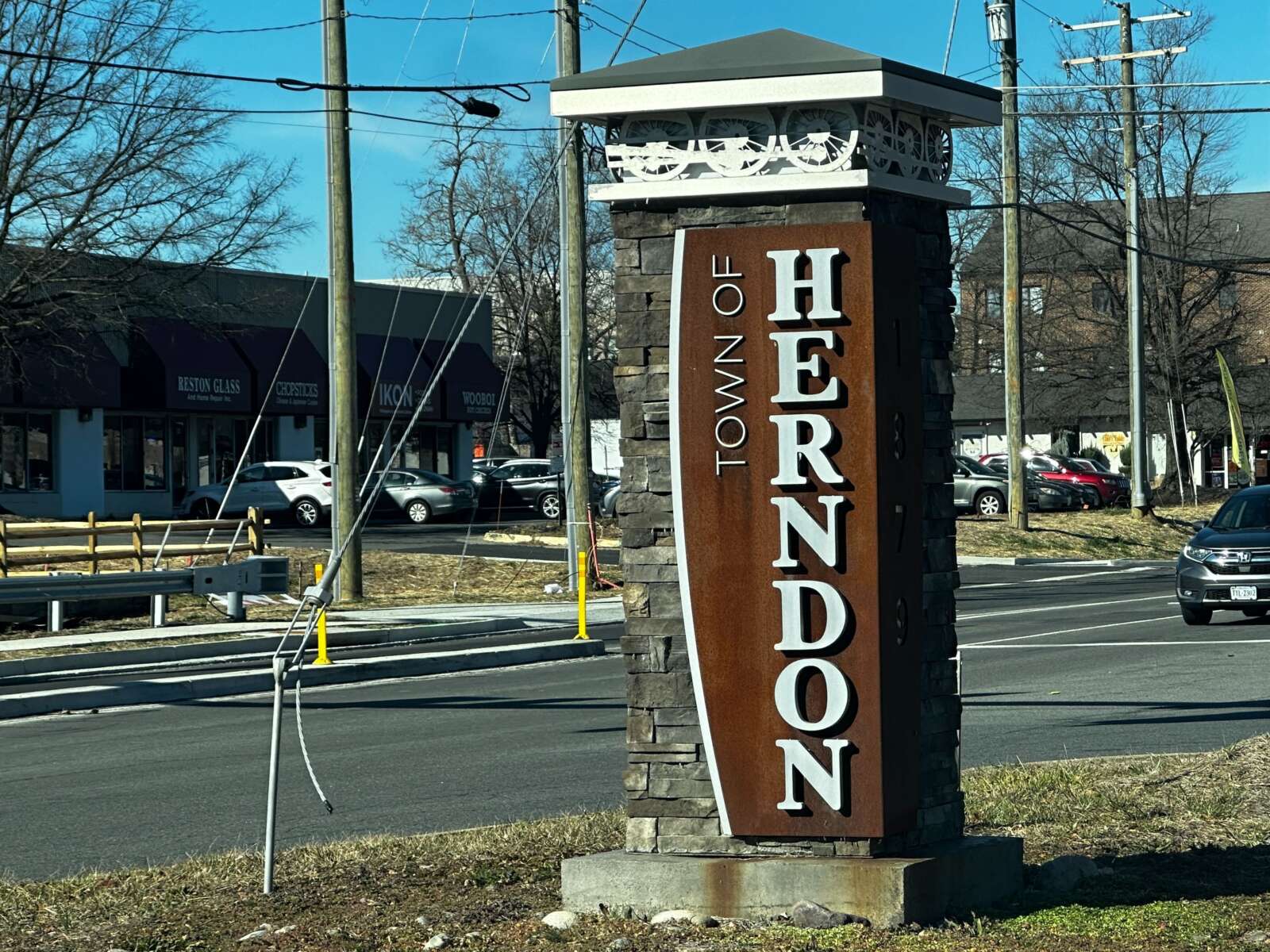
The Town of Herndon is exploring the adoption of new policy that promotes diversity, equity and inclusion.
Moved by council member Pradip Dhakal and created by the Herndon Diversity, Equity and Inclusion Committee, the “One Herndon” policy builds on the One Fairfax policy adopted by Fairfax County in 2016, which commits county and school officials to considering social and racial equity issues when providing services and making policy decisions.
“The time is now to move beyond embracing diversity as an asset and implement a new growth model driven by equity — just and fair inclusion into ‘OneHerndon,’ a community in which everyone can participate and prosper,” the draft resolution says.
At a March 5 meeting, a majority of the council expressed support for the proposal, while cautioning that the council and staff would need to evaluate ways to continue implementing the policy in meaningful and quantifiable ways.
“I’m trying to understand what we want to achieve with the policy beyond statements of equity and inclusion,” Councilmember Keven LeBlanc said.
Dhakal noted that the resolution provides guidance for creating future policies.
“It’s a step-by-step policy,” he said, adding that the policy is intended to be a “high-level guiding resolution” only.
The council plans to continue discussing the resolution at an April strategic planning meeting.
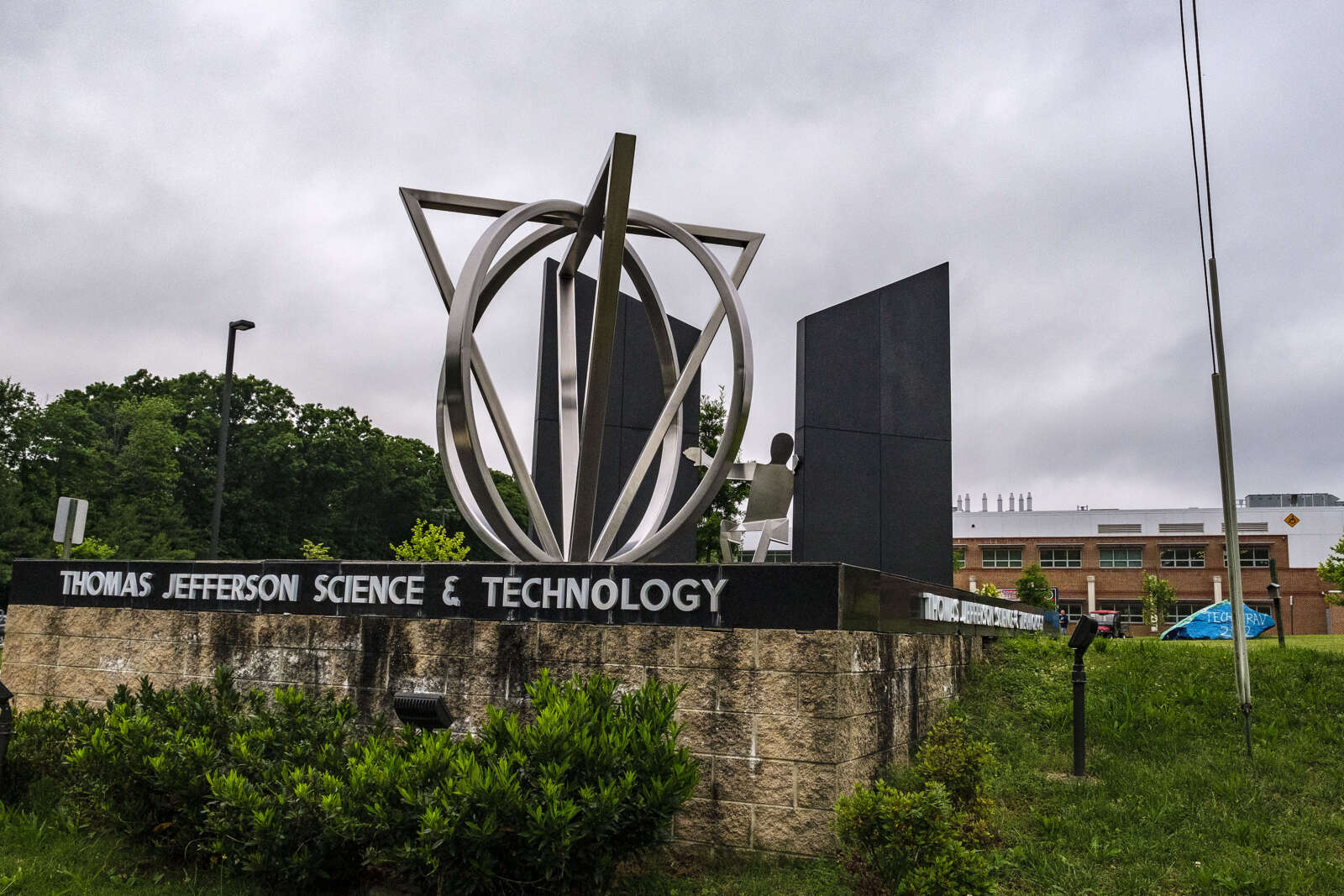
Thomas Jefferson High School for Science and Technology’s current admissions policy will remain in place after the U.S. Supreme Court declined to consider a lawsuit alleging that it discriminates against Asian students.
The Supreme Court denied a petition for a hearing today (Tuesday) by the Coalition for TJ, an advocacy group that sued the Fairfax County School Board in 2021 after the admissions process for the highly competitive magnet school was revised with the goal of diversifying the student body.
The Supreme Court’s decision not to take up the case ends a legal battle that lasted nearly three years and could’ve upended diversity initiatives in public education nationwide.
“We have long believed that the new admissions process is both constitutional and in the best interest of all of our students,” said School Board Chair Karl Frisch, who represents Providence District. “It guarantees that all qualified students from all neighborhoods in Fairfax County have a fair shot at attending this exceptional high school.”
The school board voted in December 2020 to eliminate a standardized test and application fee that were previously required for students seeking admittance into Thomas Jefferson High School (TJ). The board also raised the minimum grade point average for applicants, guaranteed eligibility to the top 1.5% of eighth graders at each middle school and added essay requirements and consideration of “experience factors” such as a student’s status as a recipient of free meals or involvement in special education.
Spurred by student activism after Fairfax County Public Schools reported that fewer than 10 Black students had been accepted in both 2019 and 2020, the policy overhaul has resulted in more diverse classes at TJ, particularly in terms of geography and income, since the changes took effect in 2021 for the Class of 2025.
Though Asian students got 61.6% of offers for the freshman class that entered last fall, compared to 19% for white students, 6.7% for Black students and 6% for Hispanic students, the Coalition for TJ has argued that the revised policy was designed to reduce the number of Asian students at the school, violating Constitutional protections against racial discrimination.
A district court judge agreed with the coalition in 2022 that Asian American students were “disproportionately harmed,” ordering FCPS to scrap the new admissions policy. However, that ruling was overturned last May by an appeals court panel that found the coalition had failed to prove that the school board “adopted its race-neutral policy with any discriminatory intent.”
The coalition petitioned the Supreme Court to pick up the case after the justices ruled in June 2023 that colleges can’t explicitly consider race as part of their admissions processes, ending decades of affirmative action programs intended to boost Black, Hispanic and other often underrepresented students.
Pacific Legal Foundation senior attorney Joshua Thompson, who represented the Coalition for TJ, says the Supreme Court “missed an important opportunity” to address admissions policies like the ones adopted for TJ that don’t explicitly consider race but still affect student demographics.
“Today, the American Dream was dealt a blow, but we remain committed to protecting the values of merit, equality, and justice,” Coalition for TJ co-founder Asra Nomani said in a statement. “…For the courageous families who have tirelessly fought for the principles that our nation holds dear, this decision is a setback but not a death blow to our commitment to the American Dream, which promises equal opportunity and justice for all.”
In a statement from FCPS, Frisch noted that TJ has accepted students from every Fairfax County middle school and maintained an average grade-point average for its incoming classes of 3.9 over the past three years.

The Town of Herndon is officially opening up its coffers to support community cultural festivals.
A Community Cultural Festival Donation Program launched this week, allowing local organizations to request funds for free, public cultural events, the Town of Herndon announced Monday (Feb. 5).
The goal of the program is to “support a variety of events…that celebrate and share the cultures represented in the community, are open and welcoming to all, and bridge parts of the community…to build understanding,” the town says.
The town council approved a policy to create the program on Oct. 23, shortly after agreeing to contribute $2,015 for a Pakistan Heritage Day event. Council members said the town needed clear guidelines and protocols for future funding requests.
Under the newly created program, nonprofit and not-for-profit organizations must meet several criteria to receive funds. The organization must be in good legal standing and funding requests should not exceed 50% of the total event budget or $10,000, whichever number is lower.
In addition, the program is intended for new events, so the requested event can’t have been held in the town within the last five years.
The organization also can’t receive a prior donation within a fiscal year. More information on how to apply is also available on the town’s website.
This fiscal year, the Town of Herndon has allocated $70,000 for the program — an amount that will vary on a yearly basis based on the council’s direction, town spokesperson Anne Curtis says.

The Town of Herndon is formalizing its donation program for cultural festivals in an effort to create a system for supporting and encouraging events that encourage cultural celebrations and promote its brand.
The move follows the council’s adoption of a policy statement that supports community cultural festivals on Oct. 24.
“Often referred to in discussions with Town Council as ‘mini-festivals,’ the desire is to complement the town’s already robust community event opportunities, with focus placed on celebrating and sharing the cultures represented in the community,” the policy statement reads.
The Herndon Town Council will discuss the matter in a meeting tomorrow (Tuesday). Organizations may request donations, but not all events will be eligible to receive town money.
Under the approved policy statement, the host organization must be a nonprofit or not-for-profit in good legal standing that’s either located in the town or offers services and programs that directly benefit the Herndon community.
The event itself must be a new community-oriented event, located within the Town of Herndon, free and open to all, and celebrate cultures found in Herndon.
If the program is approved, applicants must request a donation at least 90 days before the proposed event and submit a companion review application for the event itself.
Events that receive donations will be allowed to feature the Town of Herndon’s logo and will be used in the town’s marketing efforts.
Once the donation program is agreed upon, the town will launch it on its website.
Discussions on ways to support cultural programming in the Town of Herndon have been underway for several months. In October, the council approved $2,015 for Pakistan Heritage Day organized by town Councilmember Naila Alam and the nonprofit Global Beat Foundation. During those discussions, council members called on town staff to formalizes the processes for donation and event approvals.
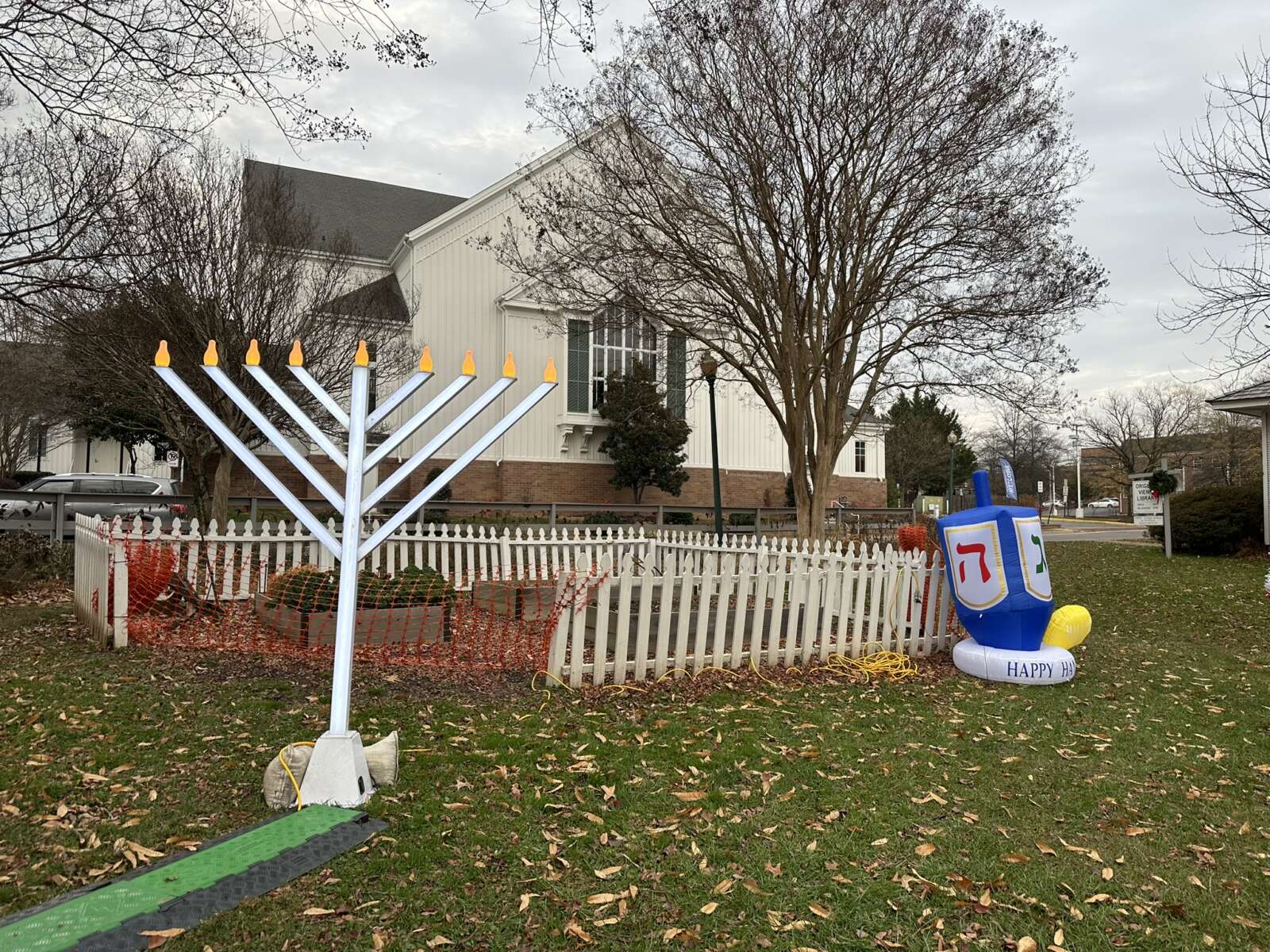
(Updated at 3:15 p.m.) The winners of Vienna’s first-ever holiday display lottery have been revealed.
A menorah and illuminated dreidel were installed late last month at the Town Green, joining a live Christmas tree — also a first for Vienna — that was lit during the annual Church Street Holiday Stroll last Monday, Nov. 27.
A winter solstice display proposed by resident and town council candidate Shelley Mountjoy is expected to be added today, the Town of Vienna announced last week.
Commemorating Hanukkah, which will unfold this year from Dec. 7-15, the menorah was installed on Nov. 28, while the dreidel came into place the following day. They were submitted, respectively, by the Chabad Tysons Jewish Center and Jewish Moms of Vienna.
The winter solstice, which kicks off the season with the shortest day of the year, will arrive at 10:27 p.m. EST on Dec. 21.
“We live in a multicultural community, and we wanted to provide an opportunity for various winter holiday traditions to be honored in our public space,” Vienna Town Manager Mercury Payton said. “Residents from all walks of life gather on the Town Green for celebrations throughout the year, and we look forward to seeing various festive displays that represent our community during the season of peace and light.”
Announced in early November, the lottery gave residents an opportunity to submit their ideas for winter holiday decor that could be installed alongside the new Christmas tree. The submission period was open through Nov. 17, and the winners were notified by Nov. 22.
However, the town only received three submissions — the maximum number it planned to select — so no actual lottery was necessary for this first year.
At the Chabad Jewish Center’s request, the town will host a menorah-lighting ceremony at the Town Green (144 Maple Avenue) at 5 p.m. Sunday, Dec. 10.
(Correction: This article initially listed the start time for the menorah-lighting ceremony as 4 p.m.)
All of the displays can remain up until Jan. 10.
In other Vienna holiday news, voting is underway for the town’s annual window decorating contest. Winners will be announced during a holiday reception at Town Hall (127 Center Street South) on Friday (Dec. 8).
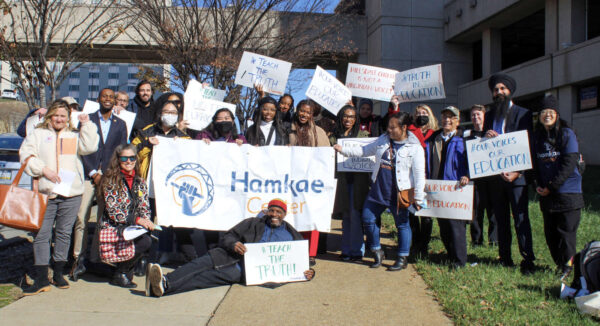
Today (Thursday) marks a decade of community service, youth leadership, political activism and civic engagement in Virginia by the Hamkae Center.
Over the last 10 years, the local nonprofit has dedicated itself to achieving “social, racial, and economic justice” through Asian American mobilization and advocacy at both the state and local levels, per its website.
“We want to not only help meet the immediate needs of Asian Americans living in Virginia, but we also want to make lasting change,” Hamkae Center Director Sookyung Oh said. “…What we really want is for Asian Americans to be actively engaged in society, in this democracy. If we can create those on-ramps for folks to be able to do that and be a political home, then that’s what we’re striving for. ”
Though it works around the state, Hamkae Center is based in Fairfax County with offices in Annandale and Centreville. Its mission has expanded alongside the local Asian American community, which has grown from 17.6% of the county’s population in 2010 to over 20% — one-fifth of the population.
“Over the years, Hamkae Center has really become much more pan-Asian,” she said. “So if you look at our staff and board, we have folks who are Korean heritage like me…but also Filipino, Indian, Pakistani, Chinese, Vietnamese, Taiwanese. It’s really expanded so that we were becoming more of an Asian American group.”
A Virginia affiliate of the National Korean American Service & Education Consortium, the group was founded in 2012 as NAKASEC Virginia with the goal of organizing with undocumented Korean Americans, according to Oh.
It was among the organizations that advocated for undocumented immigrants who attended high school in the state to be eligible for in-state tuition rates and state financial aid for college.
“It’s our work with undocumented Asian Americans that we were able to push those changes through the state General Assembly in 2020 and in 2021,” Oh said.
Oh also expressed pride in Hamkae Center’s education-related activism, including its role in leading a “statewide, multi-racial, multi-faith” movement against proposed revisions to Virginia’s history education standards.
On a more hyperlocal level, the Hamkae Center functions as a community resource, offering assistance with citizenship and public health benefit applications. According to Oh, it recently launched an Asian American Small Business Counseling program to help Korean Americans in Northern Virginia navigate complex corporate procedures and language barriers as they kickstart their own businesses.
“To date, I think we’ve supported about four entrepreneurs in starting new businesses, and that’s pretty cool,” Oh said.
To reflect its evolving focus, the group rebranded in 2021 to “Hamkae,” the Korean word for “together.” Oh says the new name aims to “honor [their] Korean American roots” while making it clearer that the organization works with all Asian Americans, not just Korean Americans. Read More
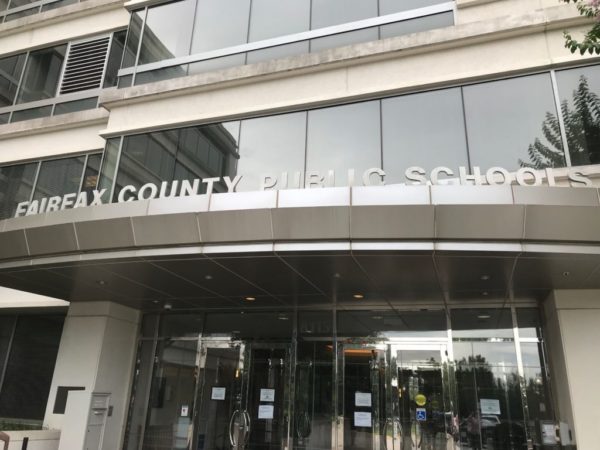
The Fairfax County School Board passed a resolution on inclusive education at its meeting Thursday (Oct. 20), leaving aside an earlier version that included references to social justice, equity and antiracism.
The 7-4 vote came with much back and forth about topics including board procedure and the resolution’s timeline.
The four members who voted against the amended resolution — Mason District Representative Ricardy Anderson, Hunter Mill District Representative Melanie Meren and members-at-large Abrar Omeish and Karen Keys-Gamarra — had expressed support for its original iteration. Providence District Representative Karl Frisch was not at the meeting.
As passed, the resolution affirms the county’s support for teachers and administrators when it comes to “inclusive curriculum and instruction.” The resolution is symbolic and does not change county policy.
“….the School Board commits to protect and support teachers and administrators as they deliver FCPS-approved curriculum and classroom resources that are inclusive, and meet the high aspirations of our students, families, and the Fairfax County community.”
Amendments also left out a reference to “recent events” that have “caused many FCPS educators and school-based administrators to fear that implementing these necessary curricular improvements could lead to personal or professional harm,” according to the text of the original resolution.
Anderson, who introduced the original resolution, said the amended version would not adequately support teachers and cited the removal of the words truth, antiracist, equity and justice as among the reasons she would not support it.
“There are some essential components that are missing from the version being provided that I just cannot support not including in this kind of resolution,” she said.
The school board’s student representative, Michele Togbe, opposed the amendments.
“Amending it to the weak and hollow statements and words, where originally it was strong and clear, it doesn’t make sense to me, and I don’t see the progress that can be made by going forward with it,” Togbe said.
Dranesville District Representative Elaine Tholen, who brought the amendment with Braddock District Representative Megan McLaughlin, said she believed the amended version was “more inclusive of our board member views and less divisive for our broad community.”
Tholen added that she thought the message of support for educators should have been conveyed with “a simple statement,” but maintained the resolution format.
While the resolution is symbolic, the board has a controversial issues policy that outlines guidelines for administrators, teachers and students dealing with controversial topics. That policy, mentioned in the amended resolution, has been discussed at multiple governance committee meetings this calendar year, according to minutes from those meetings.
After the revision passed, several people spoke about the resolution during the community participation portion of the meeting. These included representatives from Free and Antiracist Minds (FAM) and the Fairfax County Council PTA, two of the many advocacy organizations Anderson said had been involved with the original resolution.
The amended resolution “was a great way of not having to vote no but also completely undermining the substance of the actual message,” said Kweli Zukeri, representing FAM. FAM called the vote a “craven display of systemic racism” in an Oct. 21 press release.
In a video testimony, Kara Danner, a member of the FCCPTA’s executive board, said the organization supported the original resolution for the sake of students’ mental health.
Other speakers accused the board of having political motivations and questioned its priorities.
Board chair and member-at-large Rachna Sizemore Heizer said she was glad to have the resolution to support teachers, but looked ahead before adjourning the meeting.
“At the end of the day I’m excited to get into budget season and looking at our strategic plan, because that’s really where we show our values,” she said.
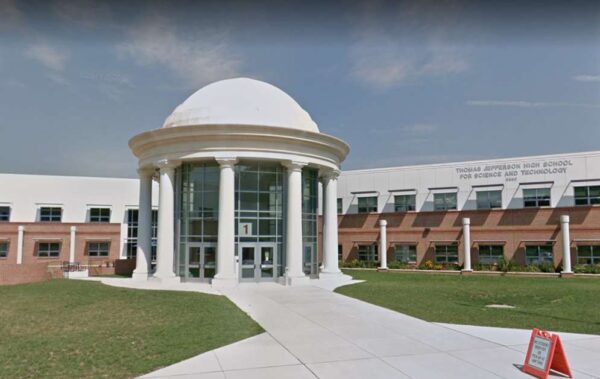
A federal judge’s ruling that recent changes to the admissions process for Fairfax County Public Schools’ prestigious magnet school were discriminatory has inspired both praise and condemnation.
As first reported by The Washington Post, U.S. District Judge Claude M. Hilton issued an opinion on Friday (Feb. 25) finding that the elimination of a standardized test and other alterations to how students are admitted into Thomas Jefferson High School for Science and Technology (TJ) were made “to the detriment of Asian-Americans.”
“It is clear that Asian-American students are disproportionately harmed by the [Fairfax County School] Board’s decision to overhaul TJ admissions,” Hilton wrote. “Currently and in the future, Asian-American applicants are disproportionately deprived of a level playing field in competing for both allocated and unallocated seats.”
Hilton also called the school board’s process for implementing the changes “remarkably rushed and shoddy” with “a noticeable lack of public engagement and transparency.”
The Coalition for TJ, a group of parents and alumni that filed the lawsuit in March 2021, celebrated the ruling as a victory “for parents everywhere who are questioning the unlawful acts of runaway school boards.”
“Coalition for TJ is thrilled by Judge Claude Hilton’s clear renunciation of racism and discrimination and his powerful defense of equality,” co-founder Asra Nomani said in a statement. “For almost two years, our courageous families have battled an incalcitrant and racist school board and superintendent intent on using ‘social justice,’ ‘equity’ and ‘anti-racism’ to perpetuate racism and discrimination against Asian students and families.”
The ruling was lauded by Gov. Glenn Youngkin, who made undoing the admissions changes part of his gubernatorial campaign, as well as advocacy groups like the Chinese American Citizens Alliance of Greater New York.
Today’s decision reaffirms that TJ’s admissions should be based on merit. We thank the parents who stood up for their children. We will work everyday to ensure that every student across VA has a quality education so they can dream big dreams and be prepared for success in life.
— Governor Glenn Youngkin (@GovernorVA) February 25, 2022
FCPS maintained that TJ admissions changes approved by the School Board on Dec. 17, 2020, are merit-based and race-neutral, noting that the first class admitted under the new system still had a majority of Asian American students and a grade point average in line with previous years.
“The new process is blind to race, gender and national origin and gives the most talented students from every middle school a seat at TJ,” FCPS Division Counsel John Foster said. “We believe that a trial would have shown that the new process meets all legal requirements.” Read More
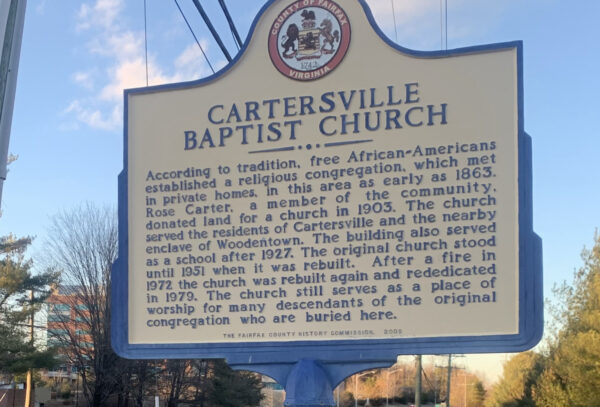
Gone are the days of history textbooks being the dominant source for grade schools.
Now, Fairfax County youth have the chance to help create historical markers that the county has been adding to the area since 1998.
The county government and Fairfax County Public Schools are looking for students from both public and private institutions, homeschool, and community groups to submit ideas for markers as part of their new Black/African American Experience initiative to collect stories showcasing the area’s diversity.
“We’re really excited just to give students an opportunity to think like historians,” Alicia Hunter, the FCPS K-12 social studies coordinator, said in a county TV program. “So it’s no longer just the memorization of dates and events and people but more so engaging in critical thinking, inquiry, research and also evaluating primary and secondary sources.”
Ramona Carroll, a program manager for the county’s Neighborhood and Community Services (NCS), noted that ideas could come from youth groups, such as a Boy Scout or Girl Scout troop, a classroom, or just one student, helping “elevate untold stories of African Americans in Fairfax County.”
Ideas can be submitted through March 31, and the county’s History Commission will review finalists.
The county launched the Black/African American Experience Project on Feb. 1, coinciding with the start of Black History Month. To support the historical markers contest, NCS is collecting residents’ oral histories, and FCPS is providing resources to support student research.
FCPS announced on July 16, 2021, that it had partnered with the Fairfax County Board of Supervisors to host the county’s first historical marker program.
“The inaugural program will focus on revealing the narratives and oral histories of our African American communities, whose rich history, culture, and accomplishments in the county, are underrepresented in our history books,” Providence District Supervisor Dalia Palchik and school board representative Karl Frisch said in a joint statement at the time.
They added that the county hopes to expand the program to include other communities in the future.
Students in Reston and Falls Church got statewide recognition last summer, when their proposals for highway markers commemorating local Asian and Pacific Islander history were among five winners of a Virginia contest.

